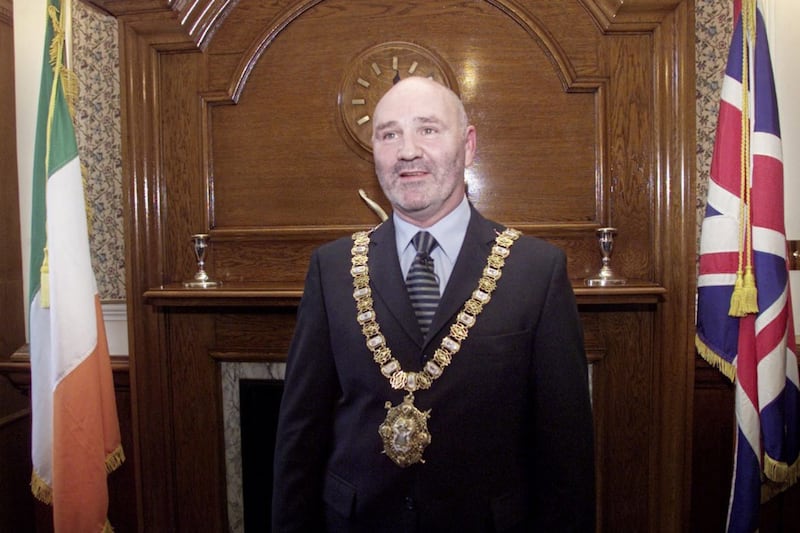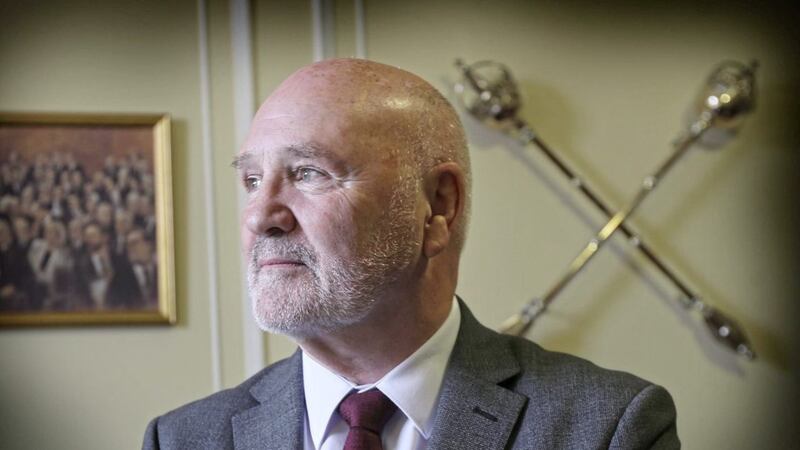A few months back Alex Maskey felt very ill and in pain. The result was a minor operation on his heart.
It was far from the veteran republican's first time under the surgeon's scalpel.
Now approaching his 70th birthday, the senior Sinn Féin man had "significant surgery" to have part of his kidneys removed following a loyalist gun attack in the 1980s, while he had a heart attack on Christmas Day in 2005.
"It is fair to say I have had a few aches and pains over the years," he says.
"However, it hasn't prevented me from carrying on my various roles and my general approach is to just get on with things."
While in hospital some weeks ago, he felt agitated because MLAs were being regularly recalled to the Assembly.
"There were lots of things going on but I really appreciated the support I was given to enable me to concentrate on my recovery," he says.
"I am conscious of my general health and of the need to seek medical attention when I know something is wrong, whereas a lot of men try to ignore issues and carry on."
Health, however, has had nothing to do with Maskey's decision to stand down as Assembly Speaker and quit the political field at the next election.
"I can honestly say that age or health were not determining factors. I had indicated to colleagues some time ago that this would likely be my last term in the Assembly, and that was well before the prospect of serving as Speaker came up," he insists.
"There comes a point where you have been in a particular role long enough and it is time to move on and make space for others to come behind you. I think I have had more than a fair innings as an elected representative for more than 40 years."
Maskey made history in 2002 as the first republican Lord Mayor of Belfast and long ago earned the accolade of being Sinn Féin's longest-serving elected representative.
Despite stepping back, Maskey is not really the retiring type.
"I like to keep busy and that won't change when I leave the Assembly," he says.
"Obviously I will continue to be politically interested and active but I have no specific roles planned."
Maskey only became Speaker when devolution returned last year and is disappointed that the Covid-19 pandemic has reduced the prospects of extending the public role of his office.
And while rejecting the assertion that he has a more combative style than the last Sinn Féin Speaker, Mitchel McLaughlin - "he issued more sanctions than me, for a start" - he also stresses that that the Assembly still needs to prove itself.
"I think most members recognise that public confidence in the Assembly was damaged over recent years and that the return of the Assembly in January 2020 would not in itself repair that damage," he says.
"The Assembly chamber serves as a shop window for the public into how our politics is working and therefore issues within my responsibility, like how our business is managed and how debate is conducted, are important to influencing public confidence in the Assembly as an institution.
"In the past, the Assembly may too often have been seen primarily as the place for divisions to be expressed, even while good work was being done. While the ability to express differing views is important, issues which damaged confidence over recent years mean that it is even more important to strengthen the functions of the Assembly to scrutinise decisions of the Executive and hold ministers to account, including through committees.
"We also need to conduct our business in a respectful way which will encourage, rather than deter people from engaging with politics. That is key to encouraging women particularly to want to be part of the Assembly."
Maskey is all about continual change. Even this week he launched another Assembly innovation, allowing individual members to speak uninterrupted on topics of their choice.
Over the summer, Maskey also finally brought the long-delayed Youth Assembly to fruition and believes it can go on to great things: "I would like to see it become a constructive and core part of our political life with a serious political voice."
Educated at St Malachy's College and Belfast Institute of Further and Higher Education, Maskey first worked as a labourer in Belfast docks. He became embroiled in the civil unrest of 1969 and was twice interned.
He also worked as a barman and became a successful amateur boxer, famously losing only four out of 75 fights.
But he was an active supporter of moves to develop 'the ballot box' side of republican strategy.

Maskey became a repeated target for loyalists. He was left with gunshots to the stomach in an attack in 1987 when he answered a knock at his door. Six years later, Alan Lundy, a man working on renovating his house, was killed after being mistaken for Maskey.
He was the first Sinn Féin councillor elected to Belfast City Hall in 1983, on the crest of the political wave generated by the hunger strikes, but it would be almost two decades before the party finally grabbed the first citizen's chair.
Maskey was elected Lord Mayor on June 6 2002 with the support of three Alliance councillors in the face of unified unionist opposition, with Nelson McCausland calling it "a night of shame for the city".
He brought the Tricolour into his office alongside the Union Flag and gained some praise by laying a wreath in memorial to British soldiers who died in the First World War, although he declined to take part in the main ceremony. His first official duty was to open the annual Presbyterian General Assembly.
He sees some parallels between the roles of Lord Mayor and Speaker. "You are there to work for the entire institution and not the party you came from," he observes.
"As Lord Mayor, I knew the important thing was for me to recognise that I was not there just to be a Lord Mayor for republicans.
"Fulfilling the role of Speaker is a bit of a culture shock at first, particularly moving away from being an active party representative to meet the requirement for the Speaker to be independent and impartial – in reality there is no such thing as a unionist, nationalist or republican Speaker.
"I have actually found it liberating that when I am doing this role I am not having to approach issues from a party political perspective."
Asked about what he has learned about unionism and loyalism, Maskey responds that it is "too simplistic to paint one picture of unionism and loyalism or nationalism and republicanism, or indeed those who see themselves as neither".
"They all contain a range of differing strands influenced by a range of wider perspectives and ideologies and they are increasingly represented by a range of different voices.
"It is important to recognise that there are some core culture tenets to unionism and loyalism which are a cherished part of that identity and which therefore have to be recognised regardless of what your own views might be."
One of the few politicians elected to the first Assembly following the Good Friday Agreement who is still serving, he found himself his party's chief whip in the building which had been the citadel of unionism, and serving on the finance and environment committees as well as championing the long fight against welfare reforms.
"I do sometimes wish that the public could see the interactions that I see between members on different sides of the Assembly," he says.
"Of course, there are political differences. It is because there are significant political differences in our Assembly that we have the structures we have.
"However, those differences do not prevent people working constructively together. I have seen personal interactions between members of opposing views which are respectful, collaborative and actually thoughtful and kind.
"It doesn't dilute the sincerity of people's views but it does put us in a better place to find ways forward. I think people would sometimes take hope from that."








